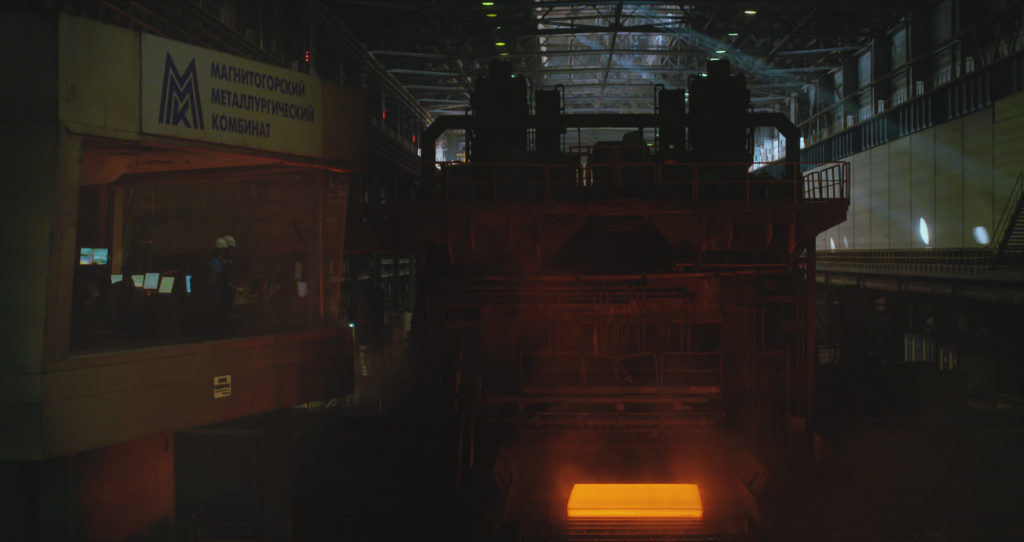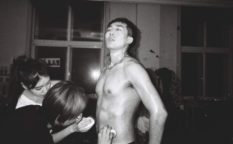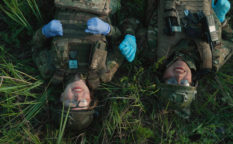Review: Kombinat (2020)

Kombinat is one of those films that immediately grabs the viewers’ attention and sucks them in its world, which in this case happens with the opening shot – a long, moderately paced drone ride through the factory yard shot from an interesting and realistic-looking angle. It is a third documentary by the Swiss filmmaker Gabriel Tejedor and it makes his comeback to the home turf of Visions du Réel since his previous outing Mayskaya Street (2017).
The story of Kombinat does not necessarily revolve around the titular steelworks factory seen in the opening scene and many times later on, but its presence is significant both for the film’s subjects and for the industrial city of Magnitogorsk, located on the south-eastern side of the Ural Mountains. The city is considered to be Russia’s doorstep to Asia and its metalworks used to be the biggest producer of iron and steel in the Soviet Union, both in the times of WWII and afterwards. The factory is still the city’s largest employer, but new times demand new, higher productivity standards, while the pollution caused by it is becoming more and more of the factor, especially for the younger generations of city folk.
Tejedor and his director of photography Camille Cottagnaud follow the circle of people that turns out to be an extended family. Lena is the owner of the salsa studio, which is quite popular in the town and gives the people a breath of the fresh air coming from the West. Sasha is a mellow-spirited man who works in the factory by day and dances avidly by night, working with Lena and the rest of the troupe in order to prepare the group act for the National Steelworkers Day celebration. Sasha’s brother Genia, however, plots to move out of the town, all the way to Novosibirsk (the distance is the same as it is to Moscow) so his daughter, born with a mental handicap due to the pollution, would grow up in a safer and healthier area.
Everything changes and everything remains the same in the industrial city stuck in between the Soviet and the contemporary mindset. There is a modern sports arena in the town, equipped with a large video wall and LED lights, but the celebration that takes place there looks and sounds the same as such events from the Cold War era, and the Victory Day parade is still the central social event of the year, where the school children are marching in uniforms and take photos while holding military weapons. It is all a part of the tradition (Magnitogorsk contributed greatly to the Soviet war effort, since most of the tanks were made from the steel coming from the Kombinat), and the older generations are defending it, even by praising Vladimir Putin for keeping themselves fed, while also keeping the whole country safe and proud. The younger ones, however, want more liberty and another kind of safety that does not involve heavy metal poisonings, cancer and children born with handicaps.
The strictly observational approach Tejedor opts for pretty much cancels the argument of the arrogant western gaze towards the daily life in Russia. He lets his subjects interact freely among themselves without meddling and commenting, his focus is more aimed at humane topics (as opposed to political and even economical ones), while their stoicism in dealing with the daily grind and finding something to be cheerful about is commendable. Cottagnaud’s camera is never intrusive, the editing handled by Christine Hoffet is more on the appropriately meditative side, but it goes well with the compact 75-minute format, while the music, be it the ambientally recorder domestic and Latin pop hits, or the dramatic neoclassical score by Julien Painot, dictates the mood quite well.
Over the course of his career, Gabriel Tejedor has become quite an expert on the former Soviet Union in the contemporary context. His debut La Trace (2013), co-directed by Enrico Pizzolato, dealt with the former gulag territory of Kolyma and the trail built by the former inmates that is still being used in the exploitation of the natural wealth. Mayskaya Street examined the dynamics of the small village in Belarus through the eyes of an 18 year old young man set against the backdrop of the electoral campaign for the country’s dictator Lukashenko. With Kombinat, he goes for more of the similar, he checks the pulse of the city and of a group of people in a visually arresting, formally thorough and ethically impeccable way.
Original title: Kombinat
Year: 2020
Runtime: 75′
Country: Switzerland
Language: Russian
Directed by: Gabriel Tejedor
Written by: Gabriel Tejedor
Cinematography by: Camille Cottagnaud
Editing by: Christine Hoffet
Music by: Julien Painot
Produced by: Xavier Derigo
Production companies: IDIP Films, RTS (Radio Télévision Suisse)
















